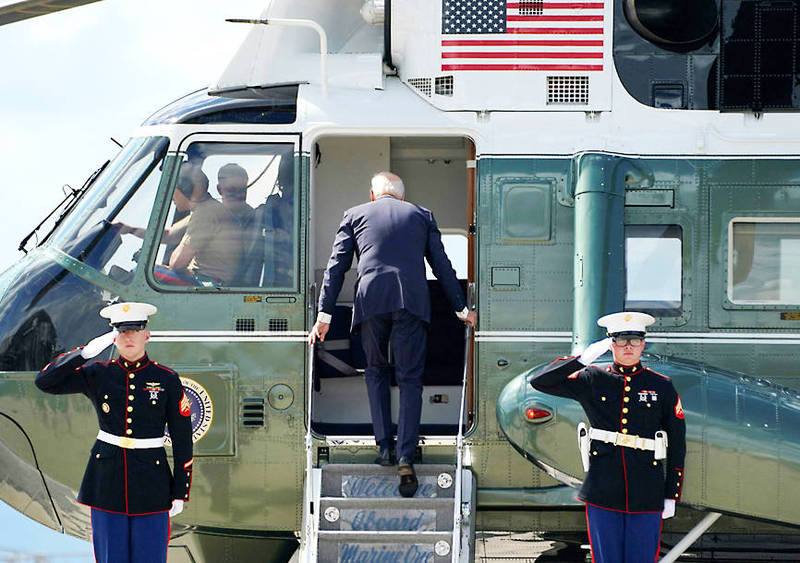《TAIPEI TIMES》 US, Japan and South Korea to ink security pledge

US President Joe Biden boards Marine One at Hagerstown Regional Airport in Maryland on Thursday as he travels to Camp David. Photo: AFP
MESSAGE TO CHINA: A US envoy said that Washington is in part looking to counter Beijing and its confidence Washington can’t convince Tokyo and Seoul to cooperate
/ AP, WASHINGTON
The US, Japan and South Korea were to sign a new security pledge, committing the three countries to consult with each other in the event of a security crisis or threat in the Pacific, officials in the administration of US President Joe Biden said on Thursday.
Details about the new “duty to consult” commitment emerged as Biden prepared to welcome South Korean President Yoon Suk-yeol and Japanese Prime Minister Fumio Kishida for a summit at the Camp David presidential retreat in Maryland yesterday.
The move is one of several joint efforts that the leaders were expected to announce at the day-long summit.
Kishida, before departing Tokyo on Thursday, told reporters that the summit would be a “historic occasion to bolster trilateral strategic cooperation” with Seoul and Washington.
“I believe it is extremely meaningful to hold a Japan-US-South Korea summit where leaders of the three countries gather just as the security environment surrounding Japan is increasingly severe,” he said.
The “duty to consult” pledge is intended to acknowledge that the three countries share “fundamentally interlinked security environments” and that a threat to one of the nations is “a threat to all,” a senior Biden administration official said.
The official spoke on the condition of anonymity to preview the coming announcement.
Under the pledge, the three countries agree to consult, share information and align their messaging with each other in the face of a threat or crisis, the official said.
The commitment does not infringe on each country’s right to defend itself under international law, nor does it alter existing bilateral treaty commitments between the US and Japan, and the US and South Korea, the official said.
The US has more than 80,000 troops based in the two countries combined.
South Korea and Japan have been divided by differing views of World War II history and Japan’s colonial rule over the Korean Peninsula from 1910 to 1945.
However, they have begun a rapprochement as their leaders grapple with shared security challenges posed by North Korea and China.
Yoon in March proposed an initiative to resolve disputes stemming from compensation for wartime Korean forced laborers.
South Korea would use its own funds to compensate Koreans enslaved by Japanese companies before the end of World War II, he said.
Kishida during a visit to Seoul in May expressed sympathy for the suffering of Korean forced laborers during Japan’s colonial rule.,
The leaders are also expected to detail in their summit communique plans to invest in technology for a three-way crisis hotline and offer an update on progress the countries have made on sharing early-warning data on missile launches by North Korea.
Other announcements expected to come out of the summit include plans to expand military cooperation on ballistic defenses and make the summit an annual event.
US Ambassador to Japan Rahm Emanuel said that Washington is in part looking to counter what he called Beijing’s bullying tactics and its confidence that the US cannot get its two most important Pacific allies — Japan and South Korea — to get along.
“Our message is we’re a permanent Pacific power and presence, and you can bet long on America,” Emanuel said at a Brookings Institution event focused on the summit. “China’s message: ‘We’re the rising power, they’re declining. Either get in line or you’re gonna get the Philippine treatment.’”
Earlier this month, the Philippine government summoned China’s ambassador and presented a diplomatic protest over the Chinese Coast Guard’s use of water cannons in a confrontation with Philippine vessels in the South China Sea.
新聞來源:TAIPEI TIMES

















